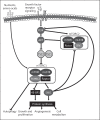Current and Future Treatment Strategies for Patients with Advanced Hepatocellular Carcinoma: Role of mTOR Inhibition
- PMID: 24159589
- PMCID: PMC3760459
- DOI: 10.1159/000343839
Current and Future Treatment Strategies for Patients with Advanced Hepatocellular Carcinoma: Role of mTOR Inhibition
Abstract
Hepatocellular carcinoma (HCC) is a common cancer that has the third highest cancer-related mortality rate worldwide. Although potentially curable by transplantation if detected early, the majority of cases are diagnosed at an advanced stage of disease for which limited treatment options are available. The only proven systemic therapy for advanced HCC is sorafenib, a multi-kinase inhibitor that has demonstrated modest efficacy and reasonable tolerability in patients with advanced HCC. Five years after the approval of sorafenib, no other agent has been proven to be beneficial in the first- or second-line setting in advanced HCC. While molecular studies have highlighted various potential targets in HCC, the mammalian target of rapamycin (mTOR) has emerged as an exciting target for cancer therapy including HCC. Laboratory data have linked the phosphatidylinositol 3-kinase/AKT/mTOR axis to various oncogenic processes, including survival and angiogenesis. Historically, mTOR inhibitors have been used for their immunosuppressive properties, but more recently they have been approved as anticancer agents. Retrospective HCC studies suggest that the inclusion of mTOR inhibition as part of an immunosuppressant regimen after transplantation may reduce HCC recurrence compared with other immunosuppressive agents such as calcineurin inhibitors. More recently, single-arm, phase I/II studies have shown that mTOR inhibitors also have activity as monotherapy in cases of recurrent HCC or de novo advanced HCC. This article will review the rationale for targeting the mTOR pathway in HCC, and the currently available clinical data supporting its development for HCC.
Keywords: Everolimus; Hepatocellular carcinoma; Immunosuppression; Sirolimus; mTOR inhibition.
Figures
References
-
- Ferlay J, Shin HR, Bray F, et al. Estimates of worldwide burden of cancer in 2008: GLOBOCAN 2008. Int J Cancer. 2010;127:2893–2917. - PubMed
-
- Jemal A, Bray F, Center MM, et al. Global cancer statistics, 2011. CA Cancer J Clin. 2011;61:69–90. - PubMed
-
- El-Serag HB. Epidemiology of hepatocellular carcinoma in USA. Hepatol Res. 2007;37:S88–S94. - PubMed
-
- Finn RS. Development of molecularly targeted therapies in hepatocellular carcinoma: where do we go now? Clin Cancer Res. 2010;16:390–397. - PubMed
Publication types
LinkOut - more resources
Full Text Sources
Other Literature Sources
Miscellaneous


